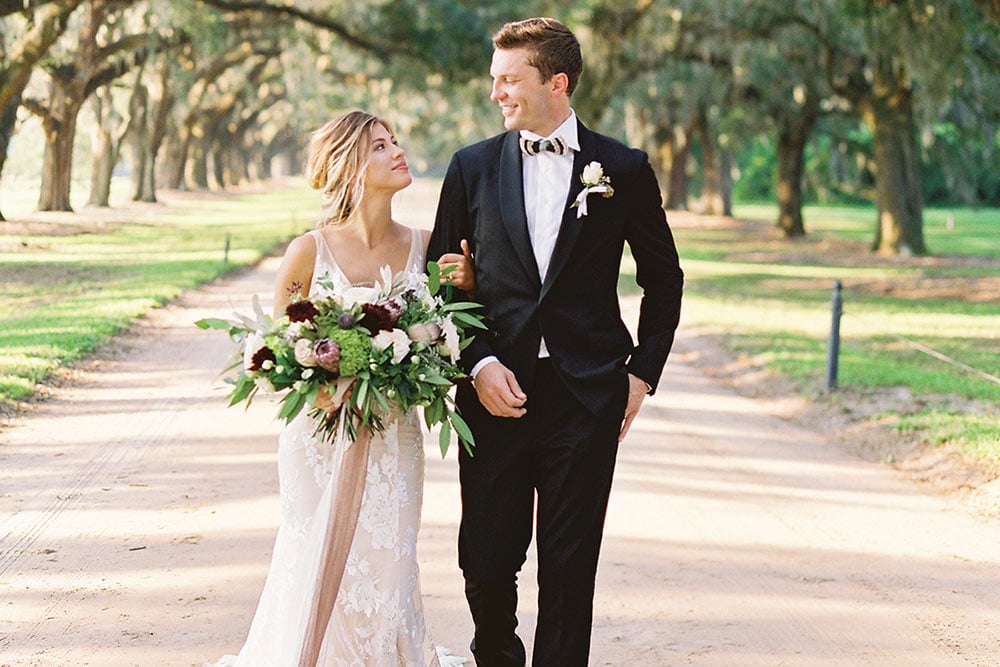Tired of planning? Then turn your attention to the prewedding festivities, where you get to be the honored guest!
As the date for your wedding draws near, you and your fiance will find yourselves the subjects of a whirlwind of parties. Some you will host, but for most you two will be the guests of honor—which means you get to pretty much relax and enjoy the festivities. Still, it helps to know what to expect. That way you can provide guidance when its requested to friends and family who are hosting a party for you.
|
STRESS-FREE PLANNING TIPS |
Bridal Showers
- Who throws the shower?
The first party to be given in your honor will most likely be a shower, which can take place anywhere from two months to three weeks before the wedding. A shower is usually given by the maid of honor, the bridal party as a group, or some close friends. It is often a surprise.
Traditionally, it is considered inappropriate for the bride's immediate family to host the shower, since it appears as if they are asking for gifts. In many parts of the country, however, this has become an acceptable practice. Another way for the mother of the bride to get involved is to help defray the costs by footing some of the catering bill or offering her home as the location. - Who's invited?
While any female (or male) who's on the wedding guest list can technically be invited to a shower, it's best to keep the event intimate, including only the bride's closest friends and relatives. The exception is a shower hosted by office workers, not all of whom may be attending the wedding but who wish to give you a celebratory send-off. It's also becoming increasingly common to host a coed shower for the couple's friends. These are generally held in addition to a traditional ladies-only event and are more casual.
Most showers have 20 to 40 guests. If more than one shower is being given, it's best to avoid duplicating the guest lists, since buying several gifts can become a real financial burden. If as many as three showers are being planned, encourage the hostesses to combine them into one or two larger events. - When should the bridal shower take place?
The best time to hold a shower is one to two months before the wedding. As the actual event draws near, the bride herself will become busier. Invitations for the shower should be sent no later than three to four weeks before the date of the event. They should include the names of the hostesses; the name of the bride,; the date, time and location of the party; a mention that its a surprise (if thats the case); any special themes; and an R.S.V.P. name and phone number. If the bride has registered her gift preferences, it is acceptable to list the name and phone number of the store on the shower invitation (but never on the wedding invitation!). - Is the bridal shower casual or formal?
The shower itself can be as casual as a pool party or as formal as a sit-down luncheon. If several parties are being planned, it can be fun to differentiate them with themes, such as a lingerie shower or kitchen shower. This also helps to avoid duplicate gifts. Another popular idea is to include a "wishing well," for which each guest brings a small household item in addition to their other gift. These smaller items are thrown into the wishing well, which can be rented, borrowed or made. - What do we do at the shower?
While it used to be de rigueur to play games at showers, most brides today prefer something a little more low-key. Plan on the shower lasting about three to four hours. Guests generally arrive a half hour or so before the bride, so everyone is there to shout "surprise!" Then the bride makes her round of greetings and the food is served. After everyone eats, the bride begins opening gifts. Bridesmaids should stand by to help with the unwrapping and someone should record whom each gift is from. Cards should be placed in each box to make doubly sure no gift giver goes unidentified. Afterward, cake and coffee is served and the party begins to break up. The host or hostesses will also want to make arrangements for the bride and groom to get all of the gifts home.
The Bridesmaids Luncheon
Hosted by the bride for her attendants, the bridesmaids luncheon is given a few weeks before the wedding as a way to say thank you to the women in the wedding party. The bride may present her attendant gifts at this event, and a pink cake with a trinket baked inside is traditionally served for dessert. According to legend, the bridesmaid whose slice contains the trinket—which can be a ring, thimble or charm—will be the next to wed.
Since busy prewedding schedules do not always allow for a last-minute luncheon, you might want to find another way to say thanks. Another good time to treat everyone to a lunch or evening cocktails is when you are all out shopping for dresses. You may also hold a get-together at your home.
The Bachelor & Bachelorette Parties
The thought of a bachelor party sends shivers of fear down the spine of many a bride, but in most cases, the scenario of all-night drinking and exotic dancers popping out of cakes is nothing more than a myth.
The bachelor party originated because it was once believed that grooms needed one last chance to sow their oats before committing. Now, it's considered an opportunity to exorcise last-minute jitters. Either way, bachelor parties today take many forms—from a quiet dinner with buddies to a beer-and-pretzel poker game or a night at the casino. Bachelor parties generally include the male attendants, male siblings of the bride and groom, and the groom's closest friends. They are best held a week or two before the wedding—discourage your fiancé's groomsmen from scheduling one any later, or else a hangover might interfere with his wedding responsibilities.
Of course, there's no reason to stay at home by yourself that night—and bachelorette parties are the perfect solution. In fact, many bridal parties have adopted the idea and enjoy their own "girls' night out" with the bridemaids and close girlfriends just before the wedding.
The Rehearsal Dinner
Every wedding needs a rehearsal, and a rehearsal dinner immediately following is the perfect time to see that everyone in the wedding gets acquainted. Traditionally, the rehearsal dinner is hosted by the groom's parents. Not only does this take some of the party-planning pressure off the bride and her parents, but it also helps the groom's family feel more involved.
The rehearsal dinner should be intimate enough to serve as a relaxing icebreaker. You will want to invite all those who attend the rehearsal itself:
- the members of the wedding party and their spouses or dates
- parents of children in the wedding party
- the officiant and his or her spouse or date
- your immediate families and their spouses or dates and children
- close friends or relatives who are participating in the ceremony
- It's also nice—if budget and space permit—to invite out-of-town wedding guests.
You may send out invitations or telephone guests and invite them. Either way, make sure you give them at least three weeks' notice, and be sure to provide the date and address of the location and an R.S.V.P. name and number.
The rehearsal dinner should be fun and lively—but there's no need to upstage or even attempt to equal the wedding itself. The most popular options include:
- an at-home party with a home-cooked or catered meal
- a restaurant with a private room or table large enough to seat everyone
- a catering hall.
The meal may be a sit-down or buffet, but either way guests should have a chance to mingle and get to know each other at some point.
Unlike a wedding reception, which revolves around music and dancing, the rehearsal dinner focuses on reminiscing about the bride's and groom's past. Generally cocktails and hors d oeuvres are served first, and the couple and their immediate families should make a point of introducing guests to each other.
Following the main course, dessert is served and the toasts begin. It's customary for the best man to start off by toasting the couple, and the groom's father (as host) may follow. At that point, everyone else can join in the fun, including the bride and groom, who will probably want to toast their parents as well.
Afterward the couple may present their gifts to the wedding party, their parents and each other. And at some point during the evening, the groom should discreetly pass the officiant's fee to the best man to bring with him the next day.
At the end of the evening (which should conclude early enough for a good night's rest), the bride and groom traditionally separate, not to see each other again until they arrive at the altar.




